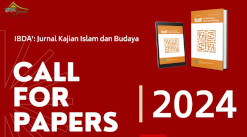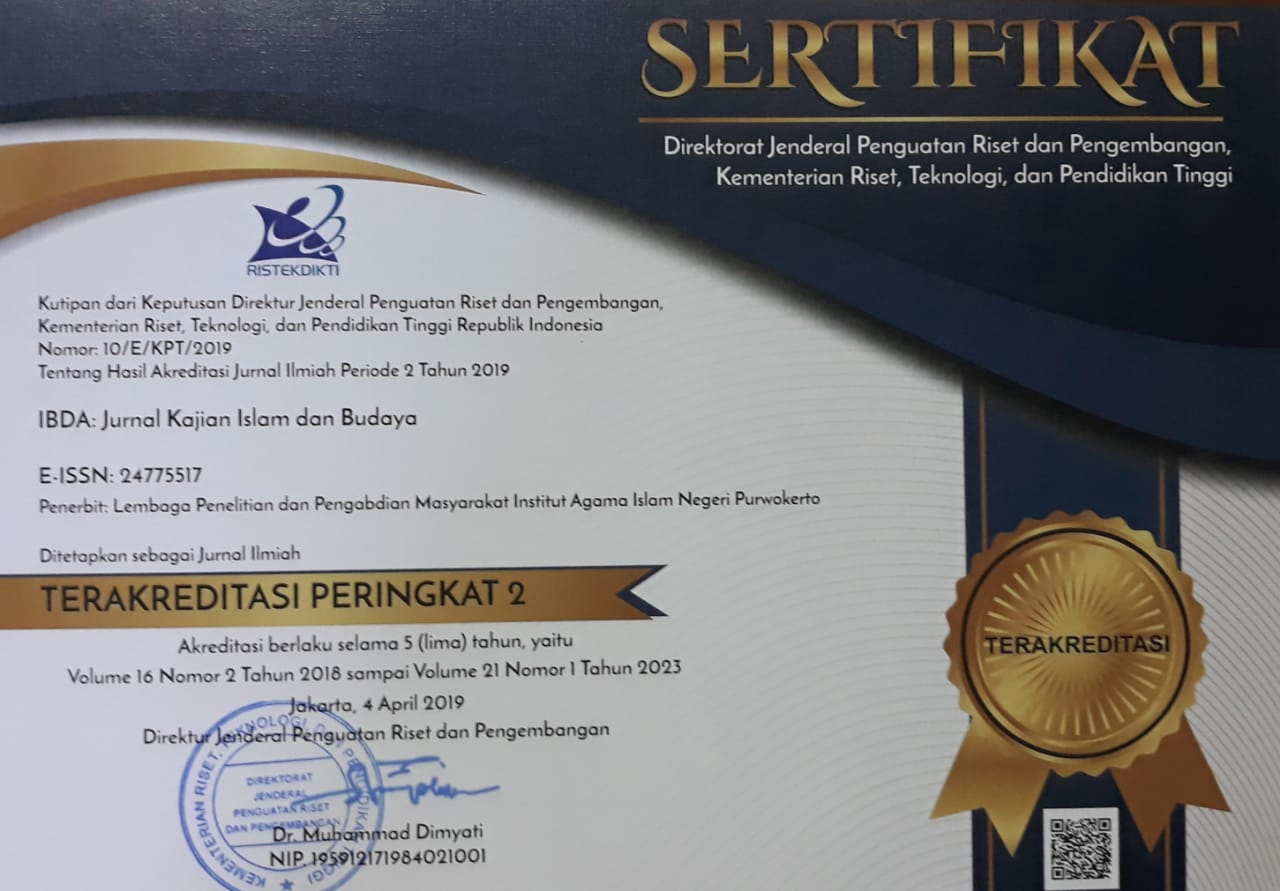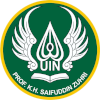Principles of the teaching of nation and state life in the Constitution of Medina
DOI:
https://doi.org/10.24090/ibda.v21i1.6747Keywords:
Constitution of Medina, life teachings, stateAbstract
Many lessons can be drawn and learned for the lives of Muslims from the guidance in the hadiths of the Prophet. Through the Medina Charter itself, the Prophet Muhammad also taught Muslims social attitudes. During the Prophet Muhammad’s life in Medina there was a multicultural society which included ethnic and cultural pluralism, with differences in culture, religion and ethnicity/race. Articles in the Constitution of Medina show the order and guidelines for the way of life of the state, and can be used for teaching people about the life of the nation and state. This study aims to establish how the ideal principles in such teachings are contained in the Constitution of Medina so that they can be implemented in the life of the nation in Indonesia today. The research methodology was based on a literature study approach, with the content analysis method used in relation to the Constitution of Medina. As for the results and research findings, the pillars of the teachings on state life in the Constitution of Medina are trust, obedience, justice, deliberation, equality, unity, freedom, recognition and protection of human rights, free trials, peace and prosperity.Downloads
References
Ahyar, M., & Huda, N. (2021). Islamic constitutionalism: Social movement and the framework of the Indonesian constitution. Constitutional Review, 7(2), 326–349. https://doi.org/10.31078/consrev726 DOI: https://doi.org/10.31078/consrev726
AlBader, F. (2020). Cultural oppression disguised as religious obligation: A fatal misrepresentation to the advancement of Muslim women’s rights in the context of the so-called honor killings. Asian Pacific American Law Journal, 24. https://doi.org/10.5070/P3241048151 DOI: https://doi.org/10.5070/P3241048151
Albar, M. K. (2019). Conflict resolution education in Medina Constitution: Contextual exegesis of Medina Constitution. Al-Tahrir: Jurnal Pemikiran Islam, 18(2), 347–370. https://doi.org/10.21154/altahrir.v18i2.1382 DOI: https://doi.org/10.21154/altahrir.v18i2.1382
Almufadda, A. M. S., Fannani, B., A Alturki, A. I., & Rohmah, S. (2020). Medina society: Lessons and their relevance in Indonesian education context. The International Journal of Interdisciplinary Educational Studies, 16(1), 1–14. https://doi.org/10.18848/2327-011X/CGP/v16i01/1-14 DOI: https://doi.org/10.18848/2327-011X/CGP/v16i01/1-14
Armia, M. S. (2018). Implementing Islamic constitutionalism: How Islamic is Indonesia constitution? Al-’Adalah, 15(2), 437–450. https://doi.org/10.24042/adalah.v15i2.3389 DOI: https://doi.org/10.24042/adalah.v15i2.3389
Badan Pusat Statistik. (2022). Persentase Penduduk Miskin Maret 2022 turun menjadi 9,54 persen. Bps.Go.Id. https://www.bps.go.id/pressrelease/2022/07/15/1930/persentase-penduduk-miskin-maret-2022-turun-menjadi-9-54-persen.html
Bayhaqī, I. al-. (2005). al-Sunan al-kubrā. Dār al-Fikr.
Bowen, J. R. (2008, April 28). Islam and the secular state: Islam and authority. The Immanent Frame. https://tif.ssrc.org/2008/04/28/islam-and-authority/
Burhanuddin, M. (2019). Conflict mapping Piagam Madinah (Analisa latar belakang sosiokultural Piagam Madinah). Jurnal Al-Ijtimaiyyah: Media Kajian Pengembangan Masyarakat Islam, 5(2), 1. https://doi.org/10.22373/al-ijtimaiyyah.v5i2.5233 DOI: https://doi.org/10.22373/al-ijtimaiyyah.v5i2.5233
Creswell, J. W., & Creswell, J. D. (2018). Research design: Qualitative, quantitative, and mixed methods approaches (5th ed.). SAGE Publications.
Diab, R. (2018). Legal-political rhetoric, human rights, and the Constitution of Medina. Rhetorica, 36(3), 219–243. https://doi.org/10.1525/rh.2018.36.3.219 DOI: https://doi.org/10.1353/rht.2018.0008
Embong, Z., Muslim, N., Musa, N. Y., Mohamed, A. F., & Jusoh, L. M. (2021). Principles of social integration in the Constitution of Medina. Academic Journal of Interdisciplinary Studies, 10(1), 382–390. https://doi.org/10.36941/ajis-2021-0032 DOI: https://doi.org/10.36941/ajis-2021-0032
Fajar, F. (2019). Praksis politik Nabi Muhammad SAW (Sebuah tinjaun teori politik modern dan ketatanegaraan). Al-Adalah: Jurnal Hukum dan Politik Islam, 4(1), 82–98. https://doi.org/10.35673/ajmpi.v4i1.215 DOI: https://doi.org/10.35673/ajmpi.v4i1.215
Farabī, A. N. M. al-. (1906). Arā’ ahl al-Madīnah al-faḍīlah. Dār al-Kitāb al-’Arabī.
Farabī, A. N. M. al-. (2016). Arā’ ahl al-Madīnah al-faḍīlah wa maḍadatihi. Hindawi.
Ferayanti, F., Embong, R., Lateh, H. M., & Kadir, F. K. A. (2019). Analysis on KH. Fahmi Basya’s Thoughts of Islamic Mathematics. International Journal of Academic Research in Progressive Education and Development, 8(2), 250–256. https://doi.org/10.6007/IJARPED/v8-i2/5767 DOI: https://doi.org/10.6007/IJARPED/v8-i2/5767
Firmansyah, A. C., & Rosy, B. (2021). Pengaruh kualitas pelayanan publik terhadap kepuasan masyarakat: Studi pembuatan e-KTP di Kecamatan Sekaran Kabupaten Lamongan. Journal of Office Administration: Education and Practice, 1(2), 82–93. https://doi.org/10.26740/joaep.v1n2.p82-93
Gade, A. M. (2010). Religious biography of the Prophet Muḥammad in twenty-first-century Indonesia. In the Cambridge companion to Muhammad (pp. 251–273). Cambridge University Press. https://doi.org/10.1017/CCOL9780521886079.013 DOI: https://doi.org/10.1017/CCOL9780521886079.013
Ghaẓaban, M. M. al-. (1982). al-Tahaluf al-siyasi fî al-Islām. Maktabah al-Manār.
Ghozali, A. M., & Zaeny, A. (2020). Implementation of pluralism values in Indonesia and its relevance to the Medina Charter. Kalam, 13(2), 191–2016. https://doi.org/10.24042/klm.v13i2.3529 DOI: https://doi.org/10.24042/klm.v13i2.3529
Gil, M., & Strassler, D. (2004). The constitution of Medina. In Jews in Islamic countries in the Middle Ages (pp. 21–45). BRILL. https://doi.org/10.1163/9789047413165_007 DOI: https://doi.org/10.1163/9789047413165_007
Glarou, D. (2017). The principle of respect for fundamental human rights and its implementation. In The impact of naturalistic and legal positivist doctrines on the implementation of International Human Rights Treaty Law (pp. 91–156). Nomos Verlagsgesellschaft mbH & Co. KG. https://doi.org/10.5771/9783845278421-91 DOI: https://doi.org/10.5771/9783845278421-91
Goldsmith Q.C., Lord. (2001). A charter of rights, freedoms and principles. Common Market Law Review, 38, 1201–1216. https://doi.org/10.1023/A:1012925931024 DOI: https://doi.org/10.54648/383895
Gomes, C. (2020). Living in a parallel society. Journal of International Students, 10(1), xiii–xv. https://doi.org/10.32674/jis.v10i1.1850 DOI: https://doi.org/10.32674/jis.v10i1.1850
Graf, P. M., Mayer, M., Zedrosser, A., Hackländer, K., & Rosell, F. (2016). Territory size and age explain movement patterns in the Eurasian beaver. Mammalian Biology, 81(6), 587–594. https://doi.org/10.1016/j.mambio.2016.07.046 DOI: https://doi.org/10.1016/j.mambio.2016.07.046
Hambali, K. M. K. @, Paudzi, N. H. M., & Sallam, A. N. S. M. (2021). Islamic perspective on the concepts of interaction among multicultural society. Afkar: Jurnal Akidah & Pemikiran Islam, 23(2), 249–274. https://doi.org/10.22452/afkar.vol23no2.7 DOI: https://doi.org/10.22452/afkar.vol23no2.7
Harpci, F. (2020). Who is my neighbor? Contemporary muslim philanthropic norms in light of the prophetic model. Journal of Muslim Philanthropy and Civil Society, 4(2), 3–27. https://doi.org/10.2979/muslphilcivisoc.4.2.01
Hishām, A. M. A. M. I. (1994). al-Sirah al-Nabawiyyah li Ibni Hishām (S. Muḥammad (ed.)). Dār al-Fikr.
Husin, W. N. W., & Ibrahim, H. (2016). Religious freedom, the Malaysian Constitution and Islam: A critical analysis. Procedia - Social and Behavioral Sciences, 217, 1216–1224. https://doi.org/10.1016/j.sbspro.2016.02.152 DOI: https://doi.org/10.1016/j.sbspro.2016.02.152
Jadeja, S. V. (2018). Condition-dependent life history strategies. University of Nebraska-Lincoln.
Jamiah, Y., Fatmawati, F., & Purwaningsih, E. (2019). Internalization of students’ nationalism sense through outbound learning based on local wisdom. JETL (Journal of Education, Teaching and Learning), 4(2), 339–344. https://doi.org/10.26737/jetl.v4i2.1642 DOI: https://doi.org/10.26737/jetl.v4i2.1642
Jinek, J. (2018). The welfare state and modern sovereignty. Politologicky Casopis, 25(3). https://doi.org/10.5817/PC2018-3-206 DOI: https://doi.org/10.5817/PC2018-3-206
Katimin, K. (2017). Politik Islam: Studi tentang azas, pemikiran dan praktik dalam sejarah politik Islam umat Islam. Perdana Publishing.
Khasasi, M. Z. A., Salleh, A. D., & Yahaya, M. Z. (2020). Position of Islam as a Federal Religion and a Determinant of Stable Socio-Religious Relations in Malaysia: Medina Charter for Reference. Pertanika Journal of Social Sciences and Humanities, 28(3), 1975–1994.
Khashogi, L. R. (2012). Konsep ummah dalam Piagam Madinah. In Right: Jurnal Agama Dan Hak Azazi Manusia, 2(1), 93–116. https://doi.org/10.14421/inright.v2i1.1234
Lapidus, I. M. (2012). Introduction: Religion and identity. In Islamic Societies to the Nineteenth Century (pp. 114–116). Cambridge University Press. https://doi.org/10.1017/CBO9781139027670.015 DOI: https://doi.org/10.1017/CBO9781139027670.015
Lukman, L. (2020). Piagam Madinah sebagai konsep budaya dan peradaban. Jurnal Bina Ummat: Membina dan Membentengi Ummat, 2(1), 27–46. https://doi.org/10.38214/jurnalbinaummatstidnatsir.v2i01.47 DOI: https://doi.org/10.38214/jurnalbinaummatstidnatsir.v2i01.47
Ma’lūf, L. (1998). Al-Munjīd fī al-Lughah wa al-ālam. Dār al-Ma’ārif.
Martirosyan, A. (2021). The realities of digital sovereignty in the modern world. International Affairs: A Russian Journal of World Politics, Diplomacy and International Relations, 67(3), 78–85. https://doi.org/10.21557/IAF.68584132 DOI: https://doi.org/10.21557/IAF.68584132
Mawardī, A. al-H. A. ibn M. ibn H. al-B. al-B. al-. (1985). Al-Aḥkām al-sulṭāniyyah wa al-wilāyah al-dīniyyah. Dār al-Fikr.
Mazuki, A. A. M., Mujani, W. K., Aziz, A., & Ermy Azziaty, R. (2013). Application of the wasatiyyah concept to the formation of the Medina Charter. International Journal of West Asian Studies, 5(2), 1–15. https://doi.org/10.5895/ijwas.2013.07
Mukrimin, M. (2012). Islamic parties and the politics of constitutionalism in Indonesia. Journal of Indonesian Islam, 6(2), 367–390. https://doi.org/10.15642/JIIS.2012.6.2.367-390 DOI: https://doi.org/10.15642/JIIS.2012.6.2.367-390
Munt, H. (1920). Muḥammad and the ‘Constitution of Medina’: The declaration of Medina’s Ḥaram. In The Holy City of Medina (pp. 42–64). Cambridge University Press. https://doi.org/10.1017/CBO9781107323773.005 DOI: https://doi.org/10.1017/CBO9781107323773.005
Nikonov, V. A., Voronov, A. S., Sazhina, V. A., Volodenkov, S. V., & Rybakova, M. V. (2021). Digital sovereignty of a modern state: Content and structural components (Based on expert research). Vestnik Tomskogo Gosudarstvennogo Universiteta. Filosofiya, Sotsiologiya, Politologiya, 60, 206–216. https://doi.org/10.17223/1998863X/60/18 DOI: https://doi.org/10.17223/1998863X/60/18
Nirenberg, D. (2004). Love between Muslim and Jew in Medieval Spain: A triangular affair. In Jews, Muslims and Christians In and Around the Crown of Aragon (pp. 127–155). BRILL. https://doi.org/10.1163/9789047401957_008 DOI: https://doi.org/10.1163/9789047401957_008
Pancawati, H. (2018). Pemikiran al-Farabi tentang politik dan negara. Aqlania, 9(1), 73–110. https://doi.org/10.32678/aqlania.v9i01.2063 DOI: https://doi.org/10.32678/aqlania.v9i01.2063
Patmawati, P. (2016). Inter-religious relations in the period of Prophet Muhammad. Al-Albab, 5(2), 175–193. https://doi.org/10.24260/alalbab.v5i2.354 DOI: https://doi.org/10.24260/alalbab.v5i2.354
Pusat Pembinaan dan Pengembangan Bahasa. (2011). Kamus Besar Bahasa Indonesia. Balai Pustaka.
Ridwan, M., Umar, H., & Harun, H. (2021). Study on human rights principles in the Medina Charter and its implementation in Indonesia. Indonesian Journal of Social Science Research, 2(2), 52–64. https://doi.org/10.11594/10.11594/ijssr.02.02.01 DOI: https://doi.org/10.11594/10.11594/ijssr.02.02.01
Sadzali, A. (2019). Konstitusionalitas Shahifah Madinah. Millah, 18(2), 235–264. https://doi.org/10.20885/millah.vol18.iss2.art3 DOI: https://doi.org/10.20885/millah.vol18.iss2.art3
Salām, A. ’Ubayd ibn. (1975). al-Amwāl. Dār al-Fikr.
Sertkaya, S., & Keskin, Z. (2020). A prophetic stance against violence: An analysis of the peaceful attitude of Prophet Muhammad during the Medinan period. Religions, 11(11), 587. https://doi.org/10.3390/rel11110587 DOI: https://doi.org/10.3390/rel11110587
Sharīf, A. I. al. (1972). Dawlah al-Rasūl fī al-Madīnah. Dār Tadir.
Soares da Silva, D., & Horlings, L. G. (2020). The role of local energy initiatives in co-producing sustainable places. Sustainability Science, 15(2), 363–377. https://doi.org/10.1007/s11625-019-00762-0 DOI: https://doi.org/10.1007/s11625-019-00762-0
Supriyanto, S., Saâ€TMidi, A. M., & Waseso, H. P. (2020). Religious moderation in the framework of cultural reservation in Banjarpanepen Banyumas. Ibda` : Jurnal Kajian Islam dan Budaya, 18(2), 318–333. https://doi.org/10.24090/ibda.v18i2.3910 DOI: https://doi.org/10.24090/ibda.v18i2.3910
Ṭabarī, N. (1987). Tarīkh al-Umām wa al-Muluk. Dār Tadir.
Vachruddin, V. P. (2021). Konsepsi dan strategi Muhammad SAW dalam mendirikan negara Madinah al-Munawwarah. Fajar Historia: Jurnal Ilmu Sejarah dan Pendidikan, 5(1), 70–88. https://doi.org/10.29408/fhs.v5i1.3355 DOI: https://doi.org/10.29408/fhs.v5i1.3355
Watt, W. M. (2022). Appendix: The Constitution of Medina. In Islamic Political Thought. https://doi.org/10.1515/9781474473484-015 DOI: https://doi.org/10.1515/9781474473484-015
Yanagihashi, H. (2019). Hadiths that originated in the Constitution of Medina. In Studies in Legal Hadith. https://doi.org/10.1163/9789004391093_009 DOI: https://doi.org/10.1163/9789004391093
Zanjawayh, I. (1986). al-Amwāl. al-Buhuth al-Dirāsah al-Islāmiyyah.
Downloads
Published
How to Cite
Issue
Section
License
Copyright (c) 2023 T. Wildan

This work is licensed under a Creative Commons Attribution-ShareAlike 4.0 International License.
Authors who publish with this journal agree to the following terms:
- Authors retain copyright and grant the journal right of first publication with the work simultaneously licensed under a Creative Commons Attribution-ShareAlike License a that allows others to share the work with an acknowledgement of the work's authorship and initial publication in this journal.
- Authors are able to enter into separate, additional contractual arrangements for the non-exclusive distribution of the journal's published version of the work (e.g., post it to an institutional repository or publish it in a book), with an acknowledgment of its initial publication in this journal.
- Authors are permitted and encouraged to post their work online (e.g., in institutional repositories or on their website) before and during the submission process, as it can lead to productive exchanges, as well as earlier and greater citation of published work (See The Effect of Open Access).

















